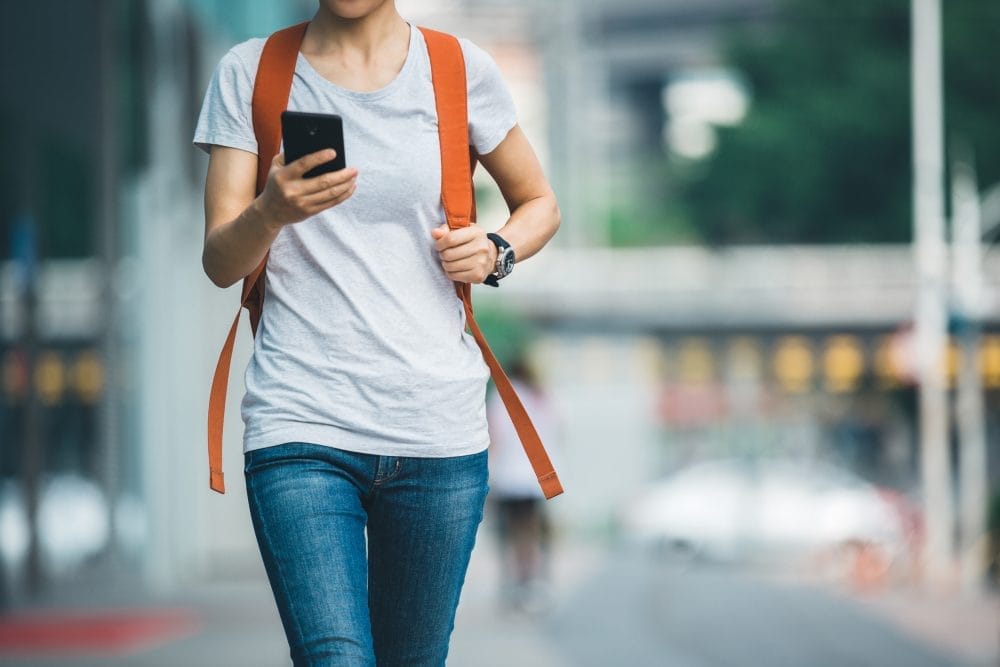Some people think danger only lurks in dark alleys or bad neighborhoods, but the truth is, predators and scammers thrive in plain sight. The habits that make someone vulnerable aren’t always obvious—they’re often everyday actions most people never think twice about.
Criminals are experts at spotting these little cues and using them to their advantage. What looks harmless to you can signal opportunity to someone else. Recognizing these habits is the first step to making sure you’re not the easiest target in the room.
1. Walking While Glued to a Phone
Looking down at a phone instantly kills situational awareness, and predators know it. When eyes are locked on a screen, the brain processes less of what’s happening nearby. This makes it easier for someone to approach unnoticed, whether to steal belongings or follow without detection. Even a few seconds of distraction can give a pickpocket or attacker all the time they need. Staying alert and scanning surroundings sends a signal that you’re not easy prey.
2. Carrying Bags Carelessly
A bag slung loosely over one shoulder or hanging open is an open invitation for theft. Opportunistic criminals can slip items out without the owner even feeling it. Crowded places like subways, concerts, and busy sidewalks are prime hunting grounds for bag snatchers. A loose grip also makes it easier for someone to yank the entire bag and vanish. Securing zippers, keeping the strap across the body, and staying mindful of the bag’s position can shut down an easy score for thieves.
3. Flashing Cash or Expensive Gear
Publicly pulling out large bills, designer wallets, or the latest tech creates an instant “worth robbing” label. Criminals are drawn to visible high-value targets, especially in areas where they can blend in and follow unnoticed. Even a quick moment of showing off an expensive watch or camera can be enough to attract the wrong kind of attention. Thieves often shadow their target until the perfect opportunity strikes. Keeping valuables subtle and discreet takes away that temptation.
4. Wearing Headphones at Full Volume
Music and podcasts can make commutes better, but they also muffle the ability to hear footsteps, voices, or sudden movement. A person immersed in sound is far less likely to notice someone approaching from behind. Predators rely on that lack of awareness to get close without alerting their target. Even worse, noise can mask the sound of a bag zipper or a phone being swiped. Keeping the volume low or using only one earbud can help maintain awareness without sacrificing entertainment.
5. Oversharing Personal Details in Public
Talking loudly on the phone or with friends about schedules, travel plans, or where you live may seem harmless, but strangers nearby could be listening. Those bits of information can be used for scams, stalking, or planned thefts. Criminals piece together details to predict when someone will be alone or when a home will be empty. Even seemingly vague comments can give away more than intended. Keeping conversations private and mindful of surroundings helps guard against unwanted attention.
6. Ignoring Gut Instincts
That uneasy feeling when someone seems to be following or staring isn’t paranoia—it’s an early warning system. Too many people brush it off to avoid seeming rude or overreacting. Predators rely on that hesitation to close the gap and control the situation. Listening to intuition and creating distance early can disrupt their plan entirely. Acting on gut instincts is one of the most effective ways to avoid becoming a victim.
7. Walking the Same Route Every Day
Predictability makes it easy for someone to anticipate movements and routines. If a stalker or thief knows exactly where and when someone will be, planning an encounter or attack becomes effortless. Repetition removes the element of surprise that helps keep potential threats off balance. Varying routes, times, and habits makes tracking much harder. The less predictable the routine, the less appealing the target.
8. Struggling With Bags, Packages, or Distractions
Juggling grocery bags, luggage, or a child’s stroller can divide attention and slow reaction time. Criminals see physical encumbrance as an advantage—someone less able to defend themselves or escape quickly. Distractions make it easier for someone to grab belongings or close the distance without being noticed. In busy areas, thieves often watch for people who look overloaded or overwhelmed. Staying balanced and keeping hands free when possible removes a big opportunity for attackers.
Stay Aware, Stay Off the Radar
Public safety isn’t about paranoia—it’s about stacking the odds in your favor. Small, harmless habits can silently signal vulnerability, but with a few adjustments, those same habits can project confidence and awareness. Criminals tend to pass over people who seem alert, unpredictable, and in control. Recognizing the cues they look for can be the difference between being targeted and being ignored.
What everyday habits do you think give away more than people realize? Share your thoughts below.
Read More
10 Public Safety Programs That Are Failing Where It Matters Most
7 Safety Apps That Give a False Sense of Security







